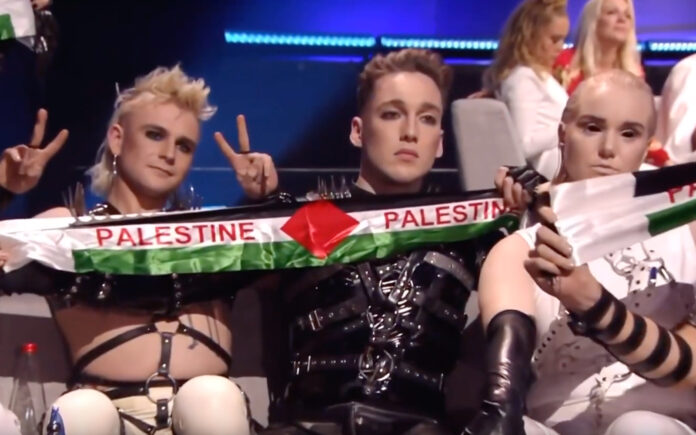By Vasiliki Theodosiou,
2012: Turkey declares that they won’t be returning to Eurovision any time soon.
2017: Ukraine prohibits Russia’s yearly entry from participating under allegations of her entering the county though the controversial Crimean ground.
2018: Hungary withdraws from the competition, characterising it as “too gay” contrasting to the government’s beliefs and ethics.
2019: Madonna as well as the group representing Iceland in the competition face criticism from the European Broadcasting Union for presenting Palestinian flags during their performance.
2021: Israel makes it to the finals with the “Set me free” song amidst an ongoing conflict in Gaza.
If one adds to the equation the exception of “the Big Five” countries from having to go through a semi-final plus a voting procedure that appears to favour the less politically controversial countries as safe choices to vote for, with some arguing that this explains Sweden’s six-time winnings, it could be argued that the Eurovision Song Contest seems far from being politically neutral.
With contestants using the stage to express their feelings and beliefs towards controversial situations and a significant number of countries feeling that their artistic work is not appreciated due to the fact that the voting procedure appears to be guided exclusively by whoever has the financial capacity to host the whole event for the following year, the public has started losing its interest in the competition and the media getting tired from constant accusations of the contest being unfair.

For an institution that has been involving for almost 65 years, the whole concept has ended up including too much drama for the organisation to handle. The media, of course, adore these stories which is what renders them prominent in Eurovision related titles that have the tendency to pile up as the dates for the happening of the event start getting closer.
As a performer, it goes without saying that when you are offered a platform of more than some thousands of viewers, one feels the need to express their thoughts an ideas reaching out to this wide audience. At the same time, when one is participating to a competition, they have the obligation to comply with the terms and conditions that its carrying out entails. Nevertheless, when one has the competition itself facing allegations of being biased and politically oriented, it is possible to question the extent to which one has the obligation to comply. If the organisation is indeed not playing by the rules, why should its competitors?
To their defence, performers like Madonna have stated that their intention was always to promote peace and equality and, therefore, they do not consider themselves as promoters of a particular political rhetoric but rather of messages that are aiming to unite the viewers. It goes without saying that the opinions surrounding those statements were quite the opposite with people being devided to the supporters of such movements and to others that utterly condemned them.
Despite these controversies, the tradition of Eurovision is undoubtedly expanding, not only by including countries that fall way beyond the European geographical borders such as Australia, but also by surviving the whole pandemic and continuing the competition overcoming the COVID-19 challenges. The winners announcement is just a breath away and so is the need to address the claims of impartiality if we want to be just towards reality and towards the truth. Can we appreciate the artistic value of each year’s entries? Can we appreciate the diversity and variety that the competition is claiming to promote? Or are we always going to be stuck in a political rhetoric and complains of coercion? One more final coming up this Saturday and one more chance for us to watch and find out.
References
- 13 times Eurovision got super political, Politico, Available here.
- Madonna makes call for Israel-Palestine unity at Eurovision, The Guardian, Available here.
- Hungary pulls out of Eurovision amid rise in anti-LGBTQ+ rhetoric, The Guardian, Available here.
- EBU condemns Madonna, Iceland for Palestinian flags at Eurovision, The Jerusalem Post, Available here.
- Amid war at home, Eden Alene to represent Israel at Eurovision Tuesday night, The Times of Israel, Available here.
- Ukraine bans Russia’s Eurovision 2017 singer Yulia Samoylova from entering country over link to Crimea, Wiwibloggs, Available here.




